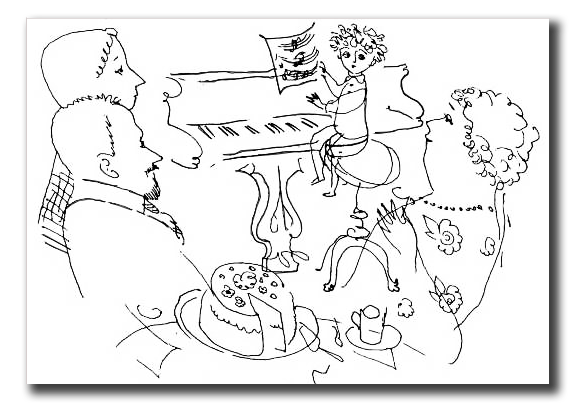A Few Words for a Parent

Playing a musical instrument, like the piano, or violin, or guitar can become a life-time pleasure; it can give you something profound and hardly describable in everyday words. Music itself is a wordless language; it’s about expressing emotions and deep feelings in a way nothing else can do. Those, who are proficient players, seem to do it so effortlessly, that quite naturally one might think that it’s not a big deal to learn how to play, especially if not in a very advanced way, but just for yourself, “for fun”.
Ladies and gentlemen, I have to tell you that those, who state that studying a musical instrument is just about fun, are terrible liars. Fun begins when you have already developed enough of finger power, ability to orient yourself in the concept of tonality, chord positions, fingering etc, so that your mind is not occupied with all of that anymore. Then you can pick and choose whatever you like and handle it with ease. Without this foundation your experience will be a constant struggle. AND the way there takes years of hard, regular, and very structured practice.
Why do a great number of students keep falling off the road? How to help them make it through the first few years of studying a tough classical instrument like a piano or violin? There are four major conditions for success: musical aptness, passion from both a student and a teacher, a lot of discipline, and committed parents. The very last one is the most important, as I and many of my colleagues think. There still exist very few of those amazing little ones, who don’t need to be constantly reminded of practicing and controlled, but they are rather a rare exception.
I’ve heard from a number of parents that they would like to give their kids “a taste of everything”, thus they don’t want their children to be overloaded with music. It may sound reasonable on the surface, but if to think about how much time a week can be devoted to individual practicing, which is the clue to playing any musical instrument, then everything stops right there. If a child is involved in two or even three sport activities at the same time (i.e. martial arts, swimming, equestrian or soccer) and takes music instrument lessons, this leaves almost no time for practicing music, having in mind that there is a lot of homework from school as well. One sport activity is absolutely necessary, but if a child has more, s/he might become a “Jack of all trades, master of none”. For getting anywhere at all, one needs to learn how to focus. Too many things on a kid’s plate can be really overwhelming, and it may result in losing interest in music. The teacher can be as entertaining as a Hollywood star, but if the student doesn’t follow with practicing individually as expected, then this whole endeavor might be doomed.
The problem with studying a musical instrument is the learning curve. It should be steep enough; without it a student will not obtain the necessary momentum to overcome the first and least pleasant stage of study – the very basics, developing the primary habits of playing, setting up the hands, fingering, reading the notes, understanding the key signature and tonalities etc., etc. If a young student doesn’t overcome this ‘gravity’ of primary unskillfulness quickly enough, then the struggle stage will continue much longer, right till the final giving up. It is not easy to find a child, who would naturally like to deal with hard and not instantly rewarding things for a large number of days, while there are so many temptations around! There are also not very many parents, who willingly accept the idea of being sometimes ‘unpopular’ with their children, making them practice the instrument instead of playing video games or spending time some other “fun” way. I am privileged to know some of such parents. Their children will continue to play and enjoy the instrument for long years after graduation. I thank them all from the bottom of my heart. ![]()
